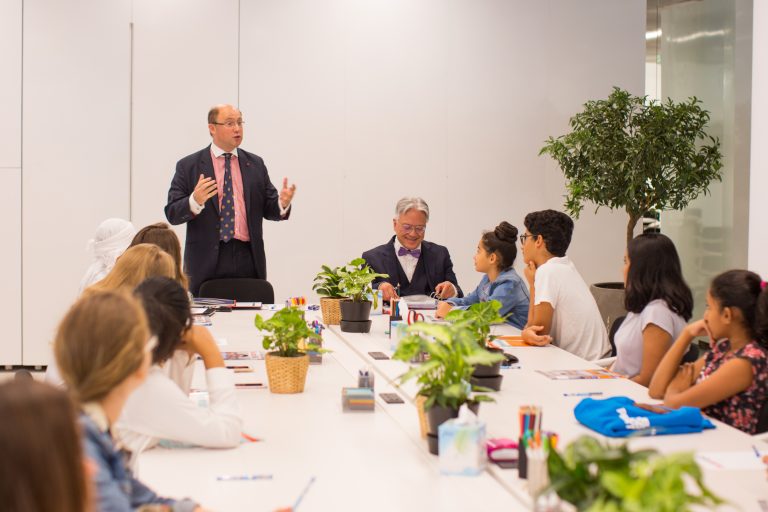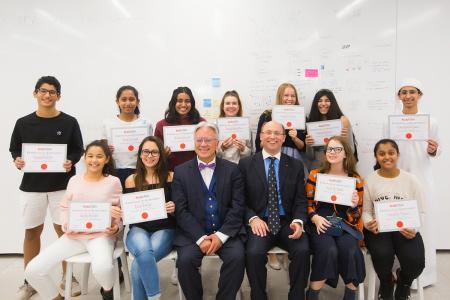Five reasons why mums are in favour of KidsMBA
by Polly Player
One thing that most modern schools have in common-even the highest achieving ones-is that teaching life skills and how to apply classroom-based learning in the real world are often glossed over, or not given any consideration at all in the constant drive to achieve tangible exam-based results.
As a result of this, many intelligent, talented and well-performing children enter the workplace or go off to university somewhat hobbled when it comes to real-world skills and business savvy, putting them at a disadvantage from the get-go. The solution to this lies in carefully targeted education to teach kids to translate their school-based learning, ideas and skills into things that can help them to find work, or set up a business of their own; carefully targeted education like the recently launched KidsMBA.
I set out to find out more about KidsMBA, and why mums across the country are talking about it. Read on to hear more about what I learnt.
What is KidsMBA?
Put simply, KidsMBA is a course aimed at kids aged 12-15. Designed to complement and enhance pre-school leavers’ education with a real-world taster of the life skills, know-how and aptitude required to run a business or become an entrepreneur, KidsMBA opens up the concept of self-employment and business management to young people from all walks of life. This gives kids a head start when it comes to finding their feet in the “real” working world outside of their school-a world that all teachers know, is becoming ever-more competitive year-on-year, which is why mums and dads of teenaged children are so positive about the KidsMBA course.
I wanted to find out more so I polled some parents and teachers to find out why this is, and here are the top five reasons given by mums and dads for why they are in favour of the KidsMBA course being brought into more schools.
- More and more job opportunities today are self-employed
Self-employment in the UK is at its highest rate for over 40 years, while the marketplace for employed roles is more competitive today than it has ever been, with hundreds of applicants competing for many entry-level vacancies. KidsMBA helps to provide young people with not only the essential life skills to become self-employed or start a business, but mums and schools also tell us that KidsMBA helps to introduce these options to kids in the first place, providing them with additional opportunities and a better chance of success when they leave school.
- Introducing the concept of business early on means no missed opportunities
KidsMBA gets kids comfortable with the concept of harnessing their skills and ideas to make a living or become an entrepreneur is something that is largely overlooked in many schools’ education curriculums. KidsMBA brings this concept home to young people, encouraging them to use the skills and knowledge learnt during the course to explore options that they might otherwise have passed on by!
- Kids learn real-world skills
KidsMBA introduces young people to important life skills such as budgeting, business writing and accounting. All of this helps kids to combine skills learned in the classroom education with real-world applications, enhancing both their abilities in core areas and their appreciation of why the topics that they learn in school will be important later on in life. This can help to improve lesson interaction, and even boost grades, as feedback from both teachers and parents has confirmed!
- Kids MBA can enhance kids’ profiles for universities
All teachers know that for kids that wish to go off to university before entering the workplace, having a strong portfolio of extracurricular activities and skills is just as important as academic achievements when it comes to competing for the best places. Kids MBA can help to enhance and strengthen young people’s university CV, and give them an edge when it comes to their college admissions.
- Kids MBA boosts confidence
Finally, KidsMBA gives young people who might be well suited to starting their own business or life as an entrepreneur the confidence to consider alternative options to beginning their working life making money for someone else, which can really boost young people’s confidence. Kids MBA mums often tell us about the marked increase in their kids’ confidence and prospects, which remain valuable long after they have completed the course and left school-based education!
kidsmba
kidsmba————————————————————————————
Kidsmba

Kidsmba
‘We Need An MBA For Kids,’ Says Advocate
By Rani Singh, Forbes Magazine Contributor. Current affairs, business and international relations
Spurred by watching the attrition to new businesses through a lack of core skills, one British insolvency lawyer is bringing business education to schools through an MBA designed for children.
Professor Mark Watson-Gandy said,
Schools teach you about savannahs and osmosis. But they don’t presently equip you with the skills you need to run a small business or be self-employed. Children need to learn how to market, budget and keep accounts. 50% of new businesses don’t survive the first five years. I formed KidsMBA Ltd to create a short intensive course to pre-school leavers and give a taster of the skills and knowledge they will need in real life.
The award-winning advocate is passionate about education.
“In practise, my area of law is fairly dry. The challenge is to explain things in a simple and – if possible – fun way. It is the same problem when you are explaining new law to a busy businessman or inspiring a sleepy student.”
His background in “dry law” has seen him not only write about legal developments for business but also write on the laws and professional codes affecting accountants and bookkeepers. The Association of International Accountants at a ceremony earlier this month honoured Watson-Gandy for his “Outstanding Contribution to the Accountancy Profession.”
The Association, from its origins in the UK and Hong Kong forty years ago, has grown into a global accountancy body. It is heavily represented in China, India, Malaysia, Singapore, and Taiwan. The professor was the first member of the legal profession to receive the accolade and only the third person to have been recognised in this way by the AIA.
KidsMBA Ltd is not the professor’s first foray into teaching. In the early 1990s, he wrote the first specialist Masters programme on Corporate Finance Law. This work saw him, aged 31, being appointed a visiting professor at the University of Westminster. He stressed,
“It was important that young lawyers were given the skills they needed to do this work. At the time, there was a skills gap amongst some of the professionals working in corporate finance. Now we see students coming from all over the world.”
The professor was later headhunted to teach on Cass Business School’s executive MBA.
He recognises that his work with KidsMBA still presents a particular challenge. The course has to be interesting enough for 12-15 year olds to participate in it.
“It is an introduction to skills, mind set, and issues. Even so, the course has to be meaningful and useful. To achieve this reflects two years of work and the input of a panel from a range of disciplines, from entrepreneurs to experts in education, banking, and accountancy.”
To achieve this, the children’s course is packed with structured games, role-play and discussion.
Watson-Gandy may have an ulterior motive for pushing the project forward. He was knighted by the Pope in 2007. This was mainly due to his record of philanthropy and pro bono work, particularly with the Vatican.
In recent years he has taken time away from his practise to go on aid missions to India and act as the legal advisor to the Nepalese Gurkhas at the 2014 UK Parliamentary Enquiry into Gurkha welfare.
Watson-Gandy sees a higher calling for an MBA-type of education.
“It was recently recognised by the World Bank that one of the key interventions needed to combat poverty is raising the productivity of the self-employed, building business skills and building business know-how. The program will also serve to promote gender equality and empower girls by giving them economic currency to gain independence.”
In the meantime, the professor is on the search for country master license holders for KidsMBA so that his course can be rolled out worldwide.
kidsmba
kidsmba————————————————————————————
Kidsmba

Kidsmba
Five Leading Global Programs Supporting The Next Generation Of Entrepreneurs
By Philip Salter, Forbes Magazine Contributor and Founder of The Entrepreneurs Network
There is an untapped opportunity to promote economic growth and reduce unemployment by expanding access to entrepreneurship education to secondary school students across the world – in particular within developing countries.
According to Educating Future Founders, our new report at The Entrepreneurs Network, the demand is certainly there from the children. A third of young people aged 18-24 worldwide intend to start a business in the next three years. Entrepreneurial intentions are strongest in Sub-Saharan Africa and Latin America and the Caribbean where over half of young people intend to start a business.
However, entrepreneurship education has traditionally taken place at universities. The report shows that there is strong evidence that earlier interventions can develop non-cognitive skills, which are key to entrepreneurial success, such as creativity, persistence, and communication.
It’s not just about business creation. Entrepreneurial skills are also valued by employers. Entrepreneurship education programs aimed at secondary school students have been shown to reduce the risk that a young person will become unemployed later in life. And skills developed through entrepreneurship education such as financial literacy, business awareness, and an entrepreneurial mindset are becoming ever more relevant as gig economy platforms lead to increased levels of self-employment.
The report highlights a number of programs supporting young entrepreneurs around the world: Teach a Man to Fish’s School Enterprise Challenge, the Prince’s Trust International’s Enterprise Challenge, ABE’s KidsMBA, Junior Achievement’s Company Program and VIVITA.
But, as the report argues, we must do more to ensure all young people have some exposure to entrepreneurial skills. As Rob May, Chief Executive of ABE says: “There must be a sense of urgency if we are to equip young people to thrive in the post-pandemic modern economy. If there was ever a moment to inspire a younger generation of entrepreneurs, it is today. This research takes a vast perspective by examining the case for school-age entrepreneurship education across multiple countries and cultures. They offer policymakers and educators vital context for rethinking curriculum planning.” Read more here.
kidsmba
————————————————————————————
KidsMBA
Read more in our brochure:

